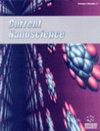A Short Appraisal on Nano-biosensors for Epigenetic Changes Detection: A Transformative Innovation
IF 1.5
4区 材料科学
Q4 BIOTECHNOLOGY & APPLIED MICROBIOLOGY
引用次数: 0
Abstract
: This mini-review article focuses on the recent advancements in nano-biosensors for the detection of epigenetic changes, a burgeoning field at the intersection of nanotechnology and cancer diagnostics. Epigenetic modifications, including DNA methylation, histone modification, and non-coding RNA expression, play a crucial role in cancer progression and drug resistance. The advent of nano-biosensors has introduced highly sensitive and specific methods for detecting these changes, surpassing the capabilities of traditional diagnostic tools. This article delves into various nano-biosensors, such as gold nanoparticles, quantum dots, carbon nanotubes, and graphene oxide sensors, highlighting their unique properties and applications in detecting epigenetic markers. It emphasizes the significance of early and accurate detection of epigenetic alterations in cancer, which opens new pathways for early diagnosis, monitoring treatment efficacy, and developing personalized therapeutic strategies. The review also addresses the technical challenges and limitations of current nano-biosensor technologies, including issues related to sensitivity, specificity, and biocompatibility. Furthermore, it explores the ethical and safety considerations in the clinical application of these nanotechnologies. The discussion extends to the potential future developments in this field, emphasizing interdisciplinary research and the integration of artificial intelligence for data analysis. This comprehensive overview of nano-biosensors for epigenetic change detection underscores their transformative potential in cancer research, offering insights into their current state, challenges, and future prospects in advancing personalized cancer care.简评用于表观遗传变化检测的纳米生物传感器:变革性创新
:这篇微型综述文章重点介绍了用于检测表观遗传变化的纳米生物传感器的最新进展,这是纳米技术和癌症诊断学交叉领域的一个新兴领域。表观遗传修饰(包括 DNA 甲基化、组蛋白修饰和非编码 RNA 表达)在癌症进展和耐药性方面发挥着至关重要的作用。纳米生物传感器的出现为检测这些变化提供了高灵敏度和特异性的方法,超越了传统诊断工具的能力。本文深入探讨了各种纳米生物传感器,如金纳米粒子、量子点、碳纳米管和氧化石墨烯传感器,重点介绍了它们在检测表观遗传标记方面的独特性能和应用。报告强调了早期准确检测癌症表观遗传学改变的重要意义,这为早期诊断、监测疗效和开发个性化治疗策略开辟了新途径。该综述还探讨了当前纳米生物传感器技术面临的技术挑战和局限性,包括与灵敏度、特异性和生物相容性有关的问题。此外,它还探讨了这些纳米技术临床应用中的伦理和安全问题。讨论延伸到这一领域未来的潜在发展,强调跨学科研究和数据分析中的人工智能整合。这篇关于用于表观遗传变化检测的纳米生物传感器的综述强调了它们在癌症研究中的变革潜力,并深入探讨了它们在推进个性化癌症治疗方面的现状、挑战和未来前景。
本文章由计算机程序翻译,如有差异,请以英文原文为准。
求助全文
约1分钟内获得全文
求助全文
来源期刊

Current Nanoscience
工程技术-材料科学:综合
CiteScore
3.50
自引率
6.70%
发文量
83
审稿时长
4.4 months
期刊介绍:
Current Nanoscience publishes (a) Authoritative/Mini Reviews, and (b) Original Research and Highlights written by experts covering the most recent advances in nanoscience and nanotechnology. All aspects of the field are represented including nano-structures, nano-bubbles, nano-droplets and nanofluids. Applications of nanoscience in physics, material science, chemistry, synthesis, environmental science, electronics, biomedical nanotechnology, biomedical engineering, biotechnology, medicine and pharmaceuticals are also covered. The journal is essential to all researches involved in nanoscience and its applied and fundamental areas of science, chemistry, physics, material science, engineering and medicine.
Current Nanoscience also welcomes submissions on the following topics of Nanoscience and Nanotechnology:
Nanoelectronics and photonics
Advanced Nanomaterials
Nanofabrication and measurement
Nanobiotechnology and nanomedicine
Nanotechnology for energy
Sensors and actuator
Computational nanoscience and technology.
 求助内容:
求助内容: 应助结果提醒方式:
应助结果提醒方式:


